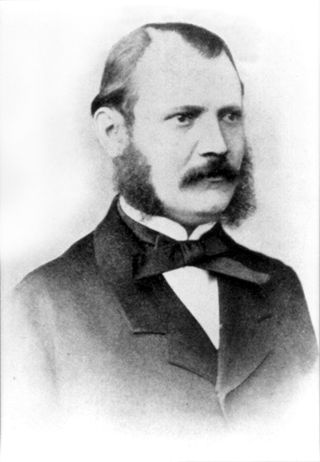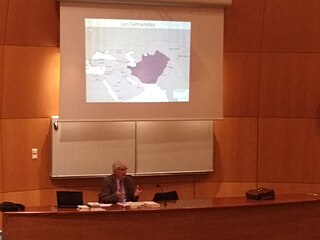Related Research Articles
A missus dominicus, Latin for "envoy[s] of the lord [ruler]" or palace inspector, also known in Dutch as Zendgraaf, meaning "sent Graf", was an official commissioned by the Frankish king or Holy Roman Emperor to supervise the administration, mainly of justice, in parts of his dominions too remote for frequent personal visits. As such, the missus performed important intermediary functions between royal and local administrations. There are superficial points of comparison with the original Roman corrector, except that the missus was sent out on a regular basis. Four points made the missi effective as instruments of the centralized monarchy: the personal character of the missus, yearly change, isolation from local interests and the free choice of the king.
The Monarchomachs were originally French Huguenot theorists who opposed monarchy at the end of the 16th century, known in particular for having theoretically justified tyrannicide. The term was originally a pejorative word coined in 1600 by the Scottish royalist and Catholic William Barclay (1548–1608) from the Greek μόναρχος and μάχομαι, meaning "those who fight against monarchs" or "anti-monarchists".
Heinrich von Fichtenau was an Austrian medievalist best known for his studies of medieval diplomatics, social, and intellectual history. He spent his academic career at the University of Vienna and from 1962 to 1983 served as director of the Institut für österreichische Geschichtsforschung. Many of Fichtenau's books were translated into English and he remains one of the few Austrian medievalists of the postwar period whose work has enjoyed a broad and influential reception in Anglophone scholarship.

Peter Štih is a Slovenian historian, specialising in medieval history.

Theodor von Sickel was a German-Austrian historian born in Aken, Province of Saxony, Kingdom of Prussia. He specialized in early European medieval history, and is considered to be the founder of modern diplomatics.

Georges Vigarello is a French historian and sociologist. He is a Research Director at the École des hautes études en sciences sociales (EHESS) of Paris. His main research interests include the sociology of the body, the history of hygiene, representations of the body over the centuries, and the social dimensions of sport.

Virgil von Graben, also Virgil vom Graben, was an Austrian noble, politician and diplomat. He was one of the most important noblemen and officials in the County of Gorizia and in the Habsburg Empire of Frederick III. and Maximilian I.

Jean Malaurie was a French cultural anthropologist, explorer, geographer, physicist, and writer. He and Kutsikitsoq, an Inuk, were the first two men to reach the North Geomagnetic Pole on 29 May 1951.
Nathalie Luca is a French research director at the French National Centre for Scientific Research (CNRS), an anthropologist and a sociologist of religions. She is director of the Center for Studies on Social Sciences of the Religious (CéSor) at the School for Advanced Studies in the Social Sciences (EHESS). She was co-editor-in-chief of the French review Archives de sciences sociales des religions.

Hieronymus Megiser was a German polymath, linguist and historian.

Albert Jäger was an Austrian priest and historian who specialized in Tyrolean history.
Georges-Henri Bousquet was a 20th-century French jurist, economist and Islamologist. He was a professor of law at the Faculty of Law of the University of Algiers where he was a specialist in the sociology of North Africa. He is also known for his translation work of the great Muslim authors, Al-Ghazali, a theologian who died in 1111 and Tunisian historian Ibn Khaldun (1332–1406). He was known as a polyglot, spoke several European languages and Eastern ones.
Karl Uhlirz was an Austrian historian and archivist.

Géza Pálffy is a Hungarian historian, full (university) professor. He has long been active in research of the relationship between the Habsburg monarchy and Kingdom of Hungary in the 16–17th centuries. He works as a scientist both in Hungary and around the world, and has published in several languages: English, German, Slovak, Croatian, Romanian, French, Russian, Italian, Czech, Turkish and Hungarian.
Josef Joachim Menzel was a German historian.

Jean-Christophe Attias is a French Jewish historian and scholar.

Jean-Pierre Arrignon was a French academic and historian. He specialized in the Middle Ages and contemporary Russia.
Denis Vidal is a French anthropologist with a doctorate degree from the Ecole Pratique des Hautes Etudes and the Université de Nanterre. He is an associate professor at the EHESS School for Advanced Studies in the Social Sciences and a senior research fellow at the Institut de recherche pour le développement.
The Treaty of Coulaines, named after the western French locality of Coulaines near Le Mans, was concluded in late 843 between Charles the Bald, king of West Francia, and his nobility and clergy. Since its validity was limited to West Francia, it has been interpreted as marking the start of a divergence between the respective legal orders of what would become the Kingdom of France and the Kingdom of Germany, just a few months after the two realms had been defined by the Treaty of Verdun. The treaty restricted the powers of the king and guaranteed rights of the nobility and clergy.
Hans Hirsch was an Austrian academic who worked between 1903 and 1914 on the vast "Monumenta Germaniae Historica" sources project, and subsequently became a full-time professional historian. He accepted an ordinary (full) professorship in history at the German University in Prague as the war ended, transferring in 1926 to the University of Vienna. The focus of his research and teaching was on medieval history. In parallel he built for himself a reputation as a specialist on the "Sudeten Germans", which marked him out as a more than averagely politicised historian. His application for party membership was still outstanding at the time of his death, however.
References
- ↑ "New professor of Medieval History Philippe Buc: 'I am just like a shepherd'". University Leiden. Retrieved 31 January 2022.
- 1 2 "Univ.-Prof. Dr. Philippe Buc .... Lebenslauf". Professor für Mittelalterliche Geschichte und Historische Hilfswissenschaften. Universität Wien (Institut für Österreichische Geschichtsforschung). Retrieved 13 December 2020.
- ↑ "Potestas: prince, pouvoir et peuple dans les commentaires de la Bible : Paris et France du Nord : 1100-1330 par Philippe Buc". Soutenue en 1989 à Paris, EHESS ... Résumé. Agence Bibliographique de l'Enseignement Supérieur (ABES), Montpellier (Moteur de recherche des thèses de doctorat françaises). Retrieved 13 December 2020.
- ↑ Martha Rampton (1 November 2002). "The Dangers of Ritual: Between Early Medieval Texts and Social Scientific Theory". review. Pacific University ("Common Knowledge"). Retrieved 13 December 2020.